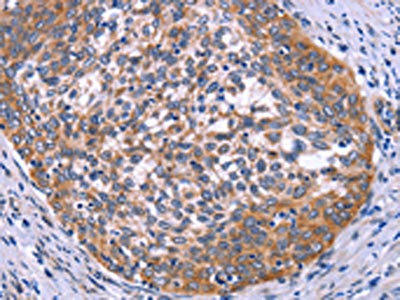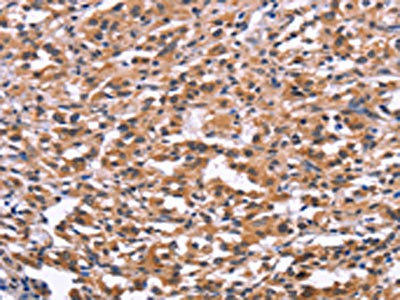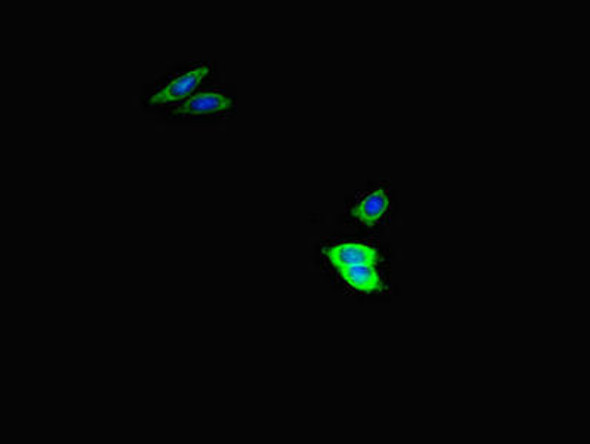Description
| Antibody Name: | USP2 Antibody (PACO15604) |
| Antibody SKU: | PACO15604 |
| Size: | 50ul |
| Host Species: | Rabbit |
| Tested Applications: | ELISA, IHC |
| Recommended Dilutions: | ELISA:1:1000-1:2000, IHC:1:25-1:100 |
| Species Reactivity: | Human, Mouse, Rat |
| Immunogen: | Fusion protein of human USP2 |
| Form: | Liquid |
| Storage Buffer: | -20°C, pH7.4 PBS, 0.05% NaN3, 40% Glycerol |
| Purification Method: | Antigen affinity purification |
| Clonality: | Polyclonal |
| Isotype: | IgG |
| Conjugate: | Non-conjugated |
 | The image on the left is immunohistochemistry of paraffin-embedded Human cervical cancer tissue using PACO15604(USP2 Antibody) at dilution 1/30, on the right is treated with fusion protein. (Original magnification: x200). |
 | The image on the left is immunohistochemistry of paraffin-embedded Human thyroid cancer tissue using PACO15604(USP2 Antibody) at dilution 1/30, on the right is treated with fusion protein. (Original magnification: x200). |
| Background: | This gene encodes a member of the family of de-ubiquitinating enzymes, which belongs to the peptidase C19 superfamily. The encoded protein is a ubiquitin-specific protease which is required for TNF-α (tumor necrosis factor alpha) -induced NF-kB (nuclear factor kB) signaling. This protein deubiquitinates polyubiquitinated target proteins such as fatty acid, synthase, murine double minute 2 (MDM2), MDM4/MDMX and cyclin D1. MDM2 and MDM4 are negative regulators of the p53 tumor suppressor and cyclin D1 is required for cell cycle G1/S transition. Multiple alternatively spliced transcript variants encoding different isoforms have been identified. |
| Synonyms: | ubiquitin specific peptidase 2 |
| UniProt Protein Function: | USP2: Hydrolase that deubiquitinates polyubiquitinated target proteins such as MDM2, MDM4 and CCND1. Isoform 1 and isoform 4 possess both ubiquitin-specific peptidase and isopeptidase activities. Deubiquitinates MDM2 without reversing MDM2-mediated p53/TP53 ubiquitination and thus indirectly promotes p53/TP53 degradation and limits p53 activity. Has no deubiquitinase activity against p53/TP53. Prevents MDM2-mediated degradation of MDM4. Plays a role in the G1/S cell-cycle progression in normal and cancer cells. Plays a role in the regulation of myogenic differentiation of embryonic muscle cells. Homooligomer. Found in trimeric complex with MDM2 and MDM4 and UPB2. Interacts with CCND1; the interaction is direct and promotes its stabilization by antagonizing ubiquitin-dependent degradation. Interacts (via N-terminus and C- terminus) with MDM2. Interacts with MDM4. Down-regulated by cisplatin. Expressed in mesangial cells of the kidney and in different types of glomerulonephritides. Cleavage is inhibited by ubiquitin in a dosage- dependent manner. Cleavage is blocked by ubiquitin aldehyde. Belongs to the peptidase C19 family. USP2 subfamily. 4 isoforms of the human protein are produced by alternative splicing. |
| UniProt Protein Details: | Protein type:Ubiquitin-specific protease; Protease; EC 3.4.19.12 Chromosomal Location of Human Ortholog: 11q23.3 Cellular Component: centrosome; perinuclear region of cytoplasm; cytoplasm; cell cortex; nucleus Molecular Function:identical protein binding; protein binding; cyclin binding; ubiquitin protein ligase binding; metal ion binding; cysteine-type endopeptidase activity; ubiquitin-specific protease activity Biological Process: proteasomal ubiquitin-dependent protein catabolic process; negative regulation of skeletal muscle development; muscle development; protein deubiquitination; protein stabilization; positive regulation of skeletal muscle development; negative regulation of transcription from RNA polymerase II promoter; positive regulation of mitotic cell cycle; cell cycle; circadian behavior; entrainment of circadian clock by photoperiod; locomotor rhythm; circadian regulation of gene expression |
| NCBI Summary: | This gene encodes a member of the family of de-ubiquitinating enzymes, which belongs to the peptidase C19 superfamily. The encoded protein is a ubiquitin-specific protease which is required for TNF-alpha (tumor necrosis factor alpha) -induced NF-kB (nuclear factor kB) signaling. This protein deubiquitinates polyubiquitinated target proteins such as fatty acid synthase, murine double minute 2 (MDM2), MDM4/MDMX and cyclin D1. MDM2 and MDM4 are negative regulators of the p53 tumor suppressor and cyclin D1 is required for cell cycle G1/S transition. Multiple alternatively spliced transcript variants encoding different isoforms have been identified. [provided by RefSeq, Aug 2011] |
| UniProt Code: | O75604 |
| NCBI GenInfo Identifier: | 20141855 |
| NCBI Gene ID: | 9099 |
| NCBI Accession: | O75604.2 |
| UniProt Secondary Accession: | O75604,Q8IUM2, Q8IW04, Q96MB9, Q9BQ21, B0YJB8, E9PPM2 |
| UniProt Related Accession: | O75604 |
| Molecular Weight: | 605 |
| NCBI Full Name: | Ubiquitin carboxyl-terminal hydrolase 2 |
| NCBI Synonym Full Names: | ubiquitin specific peptidase 2 |
| NCBI Official Symbol: | USP2 |
| NCBI Official Synonym Symbols: | USP9; UBP41 |
| NCBI Protein Information: | ubiquitin carboxyl-terminal hydrolase 2; ubiquitin thioesterase 2; deubiquitinating enzyme 2; ubiquitin specific protease 9; ubiquitin specific protease 12; 41 kDa ubiquitin-specific protease; ubiquitin-specific-processing protease 2 |
| UniProt Protein Name: | Ubiquitin carboxyl-terminal hydrolase 2 |
| UniProt Synonym Protein Names: | 41 kDa ubiquitin-specific protease; Deubiquitinating enzyme 2; Ubiquitin thioesterase 2; Ubiquitin-specific-processing protease 2 |
| Protein Family: | Protein |
| UniProt Gene Name: | USP2 |
| UniProt Entry Name: | UBP2_HUMAN |






